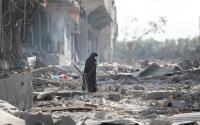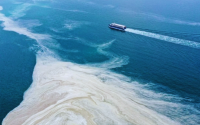22 March 2005MacDonald Stainsby
From 1974 to 1977 the Mackenzie Valley Pipeline inquiry was conducted by Thomas R Berger, making final recommendations to not construct a pipeline in the Porcupine caribou herd calving grounds along the border with Alaska's Arctic National Wildlife Refuge. In 1987, that recommendation led to an international treaty between Canada and the United States to protect both sides of the caribou's calving ground. Another recommendation that came out of the Berger inquiry was that all nations in the Valley needed to have a land claim agreement before construction could go ahead. Even without pointing to the problems presented by "extinguishment" policies carried out by the federal government of Canada, this minimum requirement has not been met. Other concerns are still just as valid: such a pipeline would require access roads, transient workers and much more development throughout the pristine valley, still mostly untouched and essential both spiritually and for subsistence to the many Dene nations who live here. This development could do massive harm to the environment, is considered unsustainable by most Dene, and would attract prostitution, drugs, more alcohol and more tourists who do not respect the land properly, all of which would erode the ability of the Dene nations to be Dene.
In the case of the Arctic National Wildlife Refuge, the Republican dominated US Senate has snuck an amendment to the budget into legislation that will allow oil companies to begin drilling perhaps as early as this year in the refuge. Not only is this in violation of international agreements that the US has with Canada regarding this, it is also a direct act of cultural genocide on the Gwitch'in people-- a nation that exists on both sides of the border, still eat 75% of their diet from subsistence sources, and who are strategically placed along the migration routes of the porcupine herd. They, like the caribou, are a migratory people who to the present are able to live with the land on a level not seen in the south. To destroy this herd is not only to destroy the last great herd of mammals that migrate in their hundreds of thousands, it will wipe out a people.
As far as the Mackenzie Valley pipeline, Imperial Oil, who the territorial government is tasking (in Orwellian fashion) with the environmental impact assessment as well as the consultation process itself, is working with the GNWT to open "pipeline readiness offices" in major centres across Denendeh. In an about face of the precedents set during the Berger Inquiry, Imperial Oil is not holding hearings in the various communities that are to be effected; only Hay River, Inuuvik and Yellowknife are holding public forums. Again, in direct contrast to the Berger inquiry, the hearings are being held only in English, and not being translated into the many Dene dialects or Inuktitut. During the Berger inquiry, environmental groups, individuals, communities and even anthropologists were able to secure funding to parallel that of the oil and gas companies in order to conduct social, cultural and environmental impact assessments independently. This time around, only the community Hay River has received even a pittance, out of 17 communities that have asked for funding. Other funding sources that were given out to various NGO's and the like totalled at the highest 15% of what was requested, all the way down to zero.
For all of these reasons and more, the "progress" of gas and oil in the north are massive acts of bad faith, direct violations of sovereign nation territory and are leading to an environmental and social disaster. These disastrous acts are preventable, and are for the good of petroleum corporations who are not making sufficient profits in Iraq, thanks to the resistance movements. They want to secure these lands almost out of spite, even if genocide is the outcome of this "energy strategy" that amounts to a drop in the empty gas can. However, we have a choice, and history is not written yet-- in either Canada or the United States. We can stop this devastation before it begins, not after. The buffalo are gone, but the porcupine herd remains. And so does our struggle.
http://www.zmag.org/content/showarticle.cfm?SectionID=56&ItemID=7507






